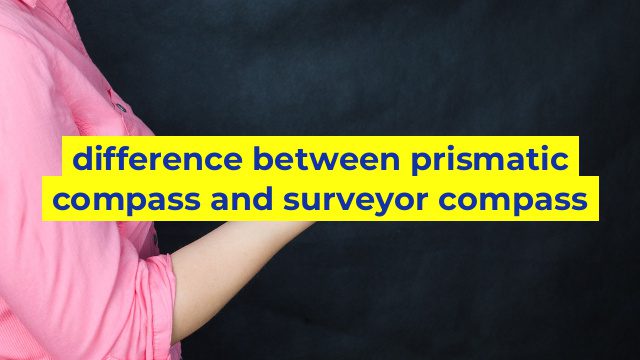Difference Between Prismatic Compass and Surveyor Compass
When it comes to surveying, compasses stand out as one of the most essential tools. Primarily, there are two types of compasses – prismatic compass and surveyor compass – each with its unique features and properties. However, the question that remains is, what is the difference between these two compasses? In this article, we will explore these differences.
Prismatic Compass
A prismatic compass is a device that is primarily used for measuring horizontal angles. The device works on the principle of reflection, and it comprises a prism and a compass needle. The prism is designed to reflect the image of the object being observed while the compass needle indicates the direction of the true north.
One of the significant advantages of the prismatic compass is that it is lightweight and portable. Additionally, it can be used in all weather conditions, including extreme cold and heat. Moreover, prismatic compasses are known to be very accurate, making them ideal for various surveys such as topographical surveys and geological surveys.
Surveyor Compass
On the other hand, a surveyor compass is used for determining the direction and location of magnetic north. Unlike the prismatic compass, the surveyor compass is heavy and usually mounted on a tripod. It features a sighting mechanism for accurately aligning the compass with the object being surveyed.
One of the significant advantages of the surveyor compass is its precision, which makes it ideal for use in surveying land and property. It is also useful in geologic surveying, mineral location, and exploration activities where accuracy is essential.
Differences Between Prismatic Compass and Surveyor Compass
Despite their different uses, both prismatic and surveyor compasses have a few noticeable differences. The most significant difference is in their design and construction. While the prismatic compass is lightweight and portable, the surveyor compass is heavy and mounted on a tripod. Additionally, prismatic compasses are designed for measuring horizontal angles, while surveyor compasses are used to determine the direction and location of magnetic north.
Another key difference between these two compasses is in their accuracy. Generally, prismatic compasses are more accurate than surveyor compasses. However, this does not mean that surveyor compasses are not precise. Surveyor compasses are still very accurate but are geared more towards practical use than scientific measurement.
In conclusion, prismatic and surveyor compasses have different strengths and weaknesses. The choice between which compass to use depends on the specific needs of the project. However, regardless of the type of compass used, it is critical to ensure accurate measurement to avoid costly errors.
Table difference between prismatic compass and surveyor compass
| Prismatic Compass | Surveyor Compass |
|---|---|
| Measures horizontal angles | Measures magnetic azimuth angles |
| Is more accurate | Is less accurate |
| Has a prism that reflects the image of the compass card and allows for easy reading of angles | Does not have a prism and requires the user to directly read the angles |
| Is typically used in mining and tunneling applications | Is typically used in surveying and engineering applications |
| Typically has a smaller size and weight | Typically has a larger size and weight |
